
Journal of Grey System
Scope & Guideline
Transforming Insights into Actionable Knowledge
Introduction
Aims and Scopes
- Grey System Theory Development:
The journal focuses on the theoretical advancements in grey system theory, exploring its foundations, principles, and evolution over time. - Modeling and Forecasting Techniques:
It emphasizes the development and application of various grey modeling techniques for forecasting and decision-making in uncertain environments. - Multi-attribute Decision-making:
The journal publishes research on multi-criteria decision-making methodologies that utilize grey relational analysis and other grey-based techniques. - Applications in Diverse Fields:
Research across various domains such as economics, environmental science, engineering, and healthcare is highlighted, showcasing the versatility of grey system applications. - Innovative Analytical Methods:
The journal is committed to publishing innovative analytical methods that enhance the understanding and application of grey systems in real-world problems.
Trending and Emerging
- Complex System Modeling:
Recent publications show a growing interest in modeling complex systems using grey theory, indicating a trend towards addressing multifaceted problems in real-world scenarios. - Environmental Applications:
There is an increasing focus on environmental applications, particularly in forecasting and assessing impacts related to climate change, pollution, and resource management. - Integration with Machine Learning:
The incorporation of machine learning techniques with grey modeling is on the rise, showcasing the journal's adaptation to technological advancements and the need for innovative analytical approaches. - Health and Social Care Applications:
Emerging themes in health and social care, particularly related to service quality assessment and elderly care, highlight the journal's commitment to addressing societal issues through grey system theory. - Data-driven Decision-making:
An upward trend in research focusing on data-driven decision-making frameworks that utilize grey systems reflects the relevance of grey theory in harnessing big data for informed decision processes.
Declining or Waning
- Traditional Grey Models:
Research on basic or traditional grey models has decreased, indicating a shift towards more complex and hybrid models that integrate additional variables and methodologies. - Static Analysis Methods:
The focus on static analytical methods has waned as researchers increasingly prefer dynamic models that account for changing conditions and time-dependent factors. - Basic Applications in Agriculture:
While agricultural applications were once prominent, there is a noticeable decline in papers focusing on basic grey models for agricultural forecasting, suggesting a move towards more interdisciplinary and innovative applications. - Single-domain Studies:
The journal has seen a reduction in studies that focus solely on one domain, with a growing trend towards interdisciplinary research that applies grey systems across multiple fields. - Simplistic Decision-making Frameworks:
There is a diminishing interest in simplistic decision-making frameworks that do not incorporate advanced analytical techniques or multi-criteria approaches.
Similar Journals

Journal of Systems Science and Systems Engineering
Bridging theory and practice in systems science.Journal of Systems Science and Systems Engineering is a prestigious academic journal aimed at fostering discourse and research in the interdisciplinary fields of Control and Systems Engineering and Information Systems. Published by SPRINGER HEIDELBERG in Germany, this journal is dedicated to advancing the understanding of complex systems through innovative methodologies and comprehensive theoretical frameworks. With its Q3 quartile rankings in both fields for 2023, it reflects a growing influence in the academic community, as evidenced by its Scopus rankings, which place it in the 45th and 40th percentiles, respectively. The journal encourages both empirical and theoretical contributions, making it a valuable resource for researchers, professionals, and students passionate about system science. Although it does not offer open access, the journal's commitment to rigorous peer review ensures high-quality, impactful research that contributes significantly to the scientific advancements in these domains.
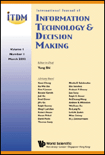
INTERNATIONAL JOURNAL OF INFORMATION TECHNOLOGY & DECISION MAKING
Innovative Research for Tomorrow's Decision MakersINTERNATIONAL JOURNAL OF INFORMATION TECHNOLOGY & DECISION MAKING, published by WORLD SCIENTIFIC PUBL CO PTE LTD, stands as a premier platform in the realm of computer science, focusing particularly on the intersection of information technology and decision sciences. Established in 2002, the journal has consistently published high-quality research, now recognized as a Q1 journal in Computer Science (miscellaneous) as of 2023, ranking 15th out of 133 in its category, which underscores its excellence and influence in the field. Although it does not currently offer Open Access options, the journal remains accessible to a broad audience of researchers, professionals, and students who seek to enhance their understanding of innovative decision-making methodologies powered by information technology. With an emphasis on interdisciplinary collaboration, this journal is dedicated to advancing theoretical and practical knowledge, making it an essential resource for anyone looking to stay at the forefront of technology-driven decision-making processes.
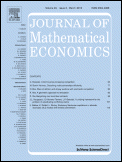
JOURNAL OF MATHEMATICAL ECONOMICS
Advancing Economic Thought with Rigorous Mathematical Analysis.JOURNAL OF MATHEMATICAL ECONOMICS, published by Elsevier Science SA, is a premier journal that bridges the gap between mathematics and economics, making significant contributions to both fields since its inception in 1974. This journal is dedicated to publishing high-quality research that applies mathematical methods to solve complex economic problems, thus nurturing an interdisciplinary dialogue essential for advancing both theoretical and practical applications in economics. With an impact factor that reflects its esteemed position (Q2 in Applied Mathematics and Economics and Econometrics as of 2023), the journal ranks prominently within its categories, promoting rigorous analysis and innovative methodologies. The Journal of Mathematical Economics invites contributions from researchers, professionals, and students alike, providing a platform for the dissemination of cutting-edge research that shapes economic thought and policy. Operating without open access, it remains a crucial resource for anyone keen to delve deeper into the mathematical foundations of economic theory, while it continues to evolve and maintain relevance through 2024 and beyond.
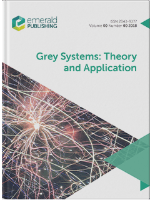
Grey Systems-Theory and Application
Transforming Theory into Practical Applications in Grey SystemsGrey Systems - Theory and Application is a premier journal dedicated to advancing the field of grey systems theory, which plays a pivotal role in addressing uncertainties in complex systems across various domains. Published by Emerald Group Publishing Ltd in the United Kingdom, this journal has established itself as a respected platform for innovative research, boasting a commendable 2023 impact factor reflected in its Q2 categorization in applied mathematics, computer science, and control systems engineering. With Scopus rankings placing it in the top tiers of its fields, it provides a robust forum for researchers, professionals, and students to explore theoretical developments and practical applications. The journal, which has been converged from 2011 to 2024, encourages open conversations on the theoretical underpinnings and real-world implications of grey systems, making it an essential resource for those looking to deepen their understanding and contribute meaningfully to this dynamic area of study.
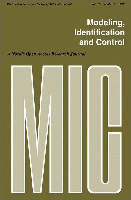
MODELING IDENTIFICATION AND CONTROL
Driving Impactful Discoveries in Software and SystemsMODELING IDENTIFICATION AND CONTROL is a prominent academic journal dedicated to the fields of Computer Science Applications, Control and Systems Engineering, Modeling and Simulation, and Software. Published by MIC in Norway, this open access journal has been providing valuable insights and innovative research since 1980, promoting the free dissemination of knowledge. With a reputation reflected in its 2023 quartile rankings—Q3 in Computer Science Applications, Q2 in Control and Systems Engineering, and Modeling and Simulation, as well as Q3 in Software—this journal plays a vital role in advancing theoretical and practical solutions within its disciplines. Researchers and professionals benefit from its rigorous peer-review process and impactful publications, fostering collaboration and the exploration of emerging technologies across various applications. The journal's continual commitment to excellence is exemplified by its active presence in Scopus, where it maintains respectable rankings in relevant engineering and computer science subcategories, supporting its goal to be a pivotal resource for scholarly communication and practical advancements.

Mathematical Foundations of Computing
Empowering Research with Open Access to Mathematical TheoriesMathematical Foundations of Computing, published by the American Institute of Mathematical Sciences (AIMS), is a distinguished open-access journal that has been actively disseminating influential research in the fields of Artificial Intelligence, Computational Mathematics, Computational Theory and Mathematics, and Theoretical Computer Science since its inception in 2009. With its E-ISSN 2577-8838, this journal is committed to providing researchers and practitioners with cutting-edge mathematical theories and methodologies that underpin modern computational practices, which is critical for advancing the field. The journal proudly holds a Q3 categorization in several relevant domains as of 2023, reflecting its contribution and accessibility amid an evolving academic landscape. By offering open access to its content, it ensures that vital research is freely available to a global audience, enhancing collaboration and innovation. Positioned in the heart of the United States, Mathematical Foundations of Computing serves as a crucial resource for advancing knowledge and fostering discussions among researchers, professionals, and students passionate about the mathematical underpinnings of computing.
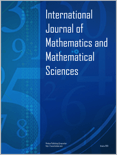
INTERNATIONAL JOURNAL OF MATHEMATICS AND MATHEMATICAL SCIENCES
Empowering researchers with accessible mathematical knowledge.INTERNATIONAL JOURNAL OF MATHEMATICS AND MATHEMATICAL SCIENCES is a distinguished peer-reviewed journal published by HINDAWI LTD, dedicated to advancing the field of mathematics and its various applications. Since its inception in 1978, the journal has been committed to open access, ensuring that research is freely available to all, thereby fostering greater collaboration and dissemination of knowledge. With an impressive Q3 ranking in the Mathematics (miscellaneous) category and a notable Scopus rank in the 72nd percentile, this journal is a vital resource for researchers, professionals, and students. The journal covers a wide range of topics in mathematics, from theoretical explorations to applied methodologies, and it continues to serve as a platform for significant contributions in this evolving discipline. Its continuous publication from 1978 to present reflects its enduring relevance and impact in the mathematical sciences community.
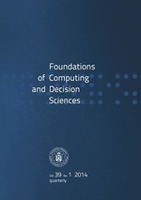
Foundations of Computing and Decision Sciences
Exploring contemporary challenges in computing disciplines.Foundations of Computing and Decision Sciences, published by SCIENDO, stands as a pivotal platform in the fields of computer science and decision-making theories. Established as an open-access journal since 2012, it facilitates the dissemination of innovative research and insights, catering to a global audience of scholars, practitioners, and students in Germany and beyond. With an ISSN of 0867-6356 and an E-ISSN of 2300-3405, the journal has made significant strides in its ranking, currently positioned in the Q3 category in Computer Science (miscellaneous) and Q4 in Theoretical Computer Science. The journal aims to foster interdisciplinary dialogues and significantly contribute to theoretical and practical advancements within the scope of computing and decision sciences. Its commitment to open access ensures that cutting-edge research is freely available, reinforcing the journal's role as a beacon for academic inquiry and knowledge sharing. With a converging timeline extending to 2024, the journal encourages submissions that address contemporary challenges and breakthroughs across various computing disciplines.
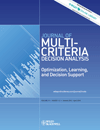
Journal of Multi-Criteria Decision Analysis
Transforming Research into Decision-Making ExcellenceThe Journal of Multi-Criteria Decision Analysis (JMCDM) is a distinguished academic publication dedicated to the interdisciplinary field of decision sciences and management strategies. Published by WILEY, this journal has been a vital resource for researchers and practitioners looking to enhance their understanding of complex decision-making processes since its inception in 1992. The journal is recognized for its rigorous peer-review process and currently holds a Q3 ranking in Decision Sciences (miscellaneous) and a Q2 ranking in Strategy and Management, highlighting its significant contributions to the field. With impressive Scopus rankings, including Rank #19 in General Decision Sciences, JMCDM provides a platform for innovative research that influences theory and practice alike. Although not completely open access, it maintains a robust electronic presence through its E-ISSN: 1099-1360. Researchers, professionals, and students can expect to find comprehensive analyses, methodological advancements, and diverse case studies that support informed decision-making in a variety of contexts.
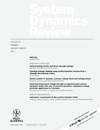
SYSTEM DYNAMICS REVIEW
Transforming research into actionable management strategies.System Dynamics Review is a premier academic journal published by Wiley, renowned for its contributions to the fields of Management of Technology and Innovation, Modeling and Simulation, and Social Sciences. With an impressive impact factor and a strong standing in various academic rankings, highlighted by its elite Q1 categorization in multiple disciplines, the journal positions itself as a vital resource for practitioners, researchers, and students alike. The journal has successfully engaged with a long tradition of scholarship, converging knowledge since 1985 and continuing to shape academic discourse through rigorous peer-reviewed articles. Researchers can access this journal through traditional subscription methods, ensuring a high-quality resource for innovative modeling approaches, strategic management insights, and in-depth analyses across social sciences. Situated in the United Kingdom, System Dynamics Review exemplifies excellence in research dissemination, making it an essential reading for anyone interested in the dynamics of complex systems and their implications for technological advancement and management strategies.